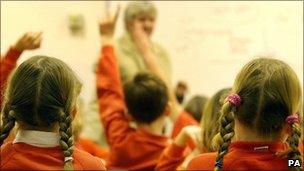New Scottish Curriculum for Excellence takes effect
- Published

The Curriculum for Excellence aims to give teachers more freedom
A controversial overhaul of classroom teaching in Scotland will take effect as secondary pupils begin returning to school after the summer break.
The Curriculum for Excellence, which has been four years in the making, aims to give teachers more freedom and make lessons less prescriptive.
Some teachers, unions and opposition parties have expressed concern the curriculum is not ready.
But Scottish ministers have given assurances it will improve standards.
Education Secretary Mike Russell said the current system was not being largely re-written.
The changes, for children between the ages of three and 18, which are already in place in primary schools, aim to focus more on teaching methods rather than content, and seek to make young people more resourceful and responsible.
The system will be introduced for children in their first year of secondary school, and will be rolled out year on year until it is implemented for all secondary years.
Speaking on BBC radio's Good Morning Scotland programme, Mr Russell said, "We already know that in the primary sector, this is a successful means of imparting education.
"The rules of physics and the grammar of French don't change as a result of that, but what does happen is that teaching methods improve.
"I'm confident that it will produce the results that Scotland needs - a well-educated group of young people and a well-educated work force."
'Quite confusing'
However, Eleanor Coner of the Scottish Parent Teacher Council told BBC Scotland that although related exams are still a few years off, parents are concerned about the lack of communication over the new curriculum.
She said: "I was speaking to a parent last night who said she just can't get her head round it and that she just doesn't understand anything about it.
"I think the problem is that the messages that have been sent out can be quite confusing at times. There needs to be more information like this on what is happening, and this is what it means for your child."
Mr Russell said he had written to the parents of each child affected by the new system, and he had been visiting schools around the country to speak to parents and teachers.
Labour, the Tories and the Lib Dems have raised concerns that the new curriculum is still too vague and have questioned whether enough funding has been made available to deliver it.
In March, Mr Russell rejected calls by secondary teachers to delay the introduction of the curriculum.
Some unions have expressed concerns that their members will not be ready to introduce the new system and pledged to create specialist groups in subject areas to provide the right support.
Labour education spokesman Des McNulty claimed SNP cuts were a threat to the new curriculum.
He said: "Newly qualified teachers are unable to get jobs and school budgets are under their tightest pressure than at any point in the last decade because the SNP have failed to prioritise our schools.
"The vital materials and information needed for the successful implementation of the Curriculum for Excellence has not yet been provided and many teachers feel the support they were promised has not been delivered by the SNP."
The Liberal Democrats said they supported the curriculum but said Mr Russell's handling of the situation was "shambolic".
Education spokeswoman Margaret Smith said: "I'm pleased that teachers are excited about teaching the new curriculum, but as children return to school today, there are still no criteria for the new national exams replacing Standard Grades.
"Teachers have to start teaching the new curriculum, but with no idea about the exams that they should be preparing children for."
- Published30 June 2010
- Published9 June 2010